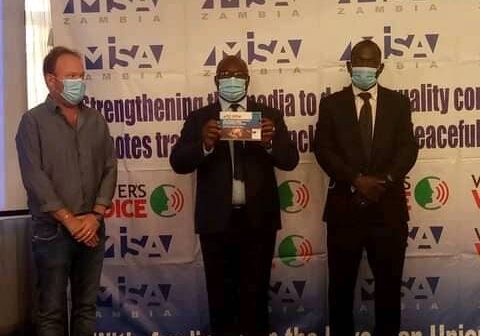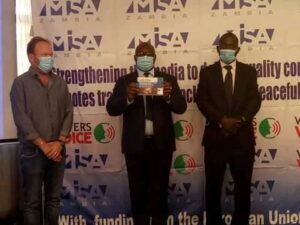BBC Media Action Country Director –Soren Winther Johannsen (Left), with Ministry of Information and Media (MIM) Permanen Secretary (PS) Amos Malupenga and MISA Zambia National Director (ND) Austin Kayanda – Picture by DERRICK SINJELA/Rainbow Newspaper Zambia Limited (RNZL), Zambian Developmental Media Alliance (ZADEMA) and Zambian Children Young People and Women in Development (ZCYPWD)
Pure Media Self Regulation at MICC read by Austin Kayanda Thursday, 19th January, 2023
Media Association for Pure Self-Regulation cheers MISA Zambia Chapter National Director Austin Kayanda
By Henry Chunza Today Zambia Newspaper
The Media Association for Pure Self-Regulation has taken the bold step of utilizing the golden opportunity provided by the current government to put in place a Pure Media Self-Regulation mechanism that will ensure media freedom but also allow the public to hold it accountable.
Speaking on behalf of the Media Association for Pure Self-Regulation, during a maiden Friday, 20th January, 2023 Press Briefing at the old Mulungushi International Conference Center (MICC) Media Institution for Southern Africa (MISA) Zambia National Director Mr. Austin Kayanda said the ‘new association’ as collaborators has begun the process to establish a mechanism in line with the progressive policy environment offered by the government.
Mr. Kayanda said interest groups will commence capacity building for journalists and media houses to understand the pitfalls of media regulation backed by law and engagement meetings with the media and journalists in order to develop and implement the mechanism.
The MISA Zambia National Director said a code of conduct will be developed and a constitution shared with the media and the public.
Kayanda said the documents will be developed from the available documents that were produced under the previous process and inimical clauses shall be removed in order to ensure an effective but conducive mechanism that strikes a balance between media accountable for its action.
Kayanda added that once standards are developed, they will set for themselves regarding the ethics and guidelines for media conduct and content gathering, processing and publication and avail to the public to use established tenets to hold the media accountable that will subscribe to the mechanism accountable.
“As Media Association for Pure Self-Regulation, we welcome any media body, journalists that want to be part of the process to join us. Make no mistake, we are an alliance that is open and welcoming to new entrants but we shall not impose ourselves either,” Kayanda.
Kayanda said that they will work at strengthening partnerships with Journalism unions to address journalists condition of service and also to get a better pay too because it guarantees good output.
Protested Kayanda: “The talks to establish a media regulation mechanism started some time in 2018 but stalled due to inimical clauses in the Zambia Media Council (ZAMEC) Bill that included mandatory registration of individual journalists and sanctions directed at individual erring journalists in the ZAMEC Bill. The ZAMEC Bill would have made it an offense for anyone to practice journalism without a license in Zambia. And such a journalist or individual could be jailed up to three years if found practicing without a licence”.
Flanked by Panos Institute Southern Africa (PSAf) Executive Director Vusumuzi Sifile, MISA Zambia Programmes Manager, Jane Chirwa, Kennedy Mambwe and Davies Kabuswe, the Executive President of Sun FM in Zambia, Kayanda said licencing of Journalism is a threat to freedom of expression because the Zambian Constitution provides for freedom of expression and freedom of association.
Kayanda observed that if the registration to a media body was mandatory for journalists in Zambia, then the right to freedom of expression would require a licence by extension adding that while it sounds good on paper, that there will be a limit as to whom can enter the profession, one should remember that it is in this country Zambia that Prime Television, (TV) and Radio stations have had their licences either withdrawn or suspended especially in critical times.
However, Kayanda said regulation are needed but must not compromise the autonomy and the ability by the media to play its role in society as The Fourth Estate after the Executive the legislature and the Judicially.
Kayanda gave an example of one of the most powerful newspaper, The Post Newspaper, then owned by Dr. Fred Namakando M’membe shutdown, by the then Patriotic Front (PF) leadership.
the paper that fully played its watchdog role and exposed corruption which courts were able to prove and corrupt persons were jailed.
MISA Zambia National Director commended the current government who have started revising some laws to ensure the legal environment is not opposite to the media.
The government has amended Section 69 of the Penal Code, which caused many journalists to be arrested and appear in court.
This section which provided for Defamation of the President has costed media time and resources to handle such cases including sending a chilling effect on upcoming journalists and media houses.
“Therefore, the repeal of this law is very welcome and this law could cause journalists to be jailed up to three years,”noted Kayanda.
The state is equally reviewing the Public Order Act (POA) and the Cyber Security Crimes Act to address any clauses that are inimical to media freedom and freedom of expression and the enactment of the Access to Information Law, now at very progressive stage as Zambia entrenches democracy.
And Kayanda says Journalists must be the drivers of media regulation and not the state and having a law to establish a media regulation mechanism places journalism regulation in the hands of those making the law which is not supposed to be the case.
Ends
Here is a
JOINT STATEMENT BY MEDIA ASSOCIATIONS FOR PURE SELF-REGULATION
ISSUED ON 19 JANUARY 2023
AT MULUNGUSHI INTERNATIONAL CONFERENCE CENTER – KK WING LUSAKA
DELIVERED BY MR AUSTIN KAYANDA – NATIONAL DIRECTOR MISA ZAMBIA ON BEHALF OF THE MEDIA ASSOCIATIONS FOR PURE SEL-REGULATIONMembers of the Associations for Pure Media Self-Regulation present
Members of the Press
Ladies and gentlemenGood morning,
It is a pleasure to address you all this morning on behalf of media associations for pure self- regulation.As you can tell, the media associations present seek to establish a pure media self-regulation mechanism to provide the public a mechanism to hold the media accountable for their actions.
The Media Associations for Pure Self-Regulation, was formed following deliberations held over a period of six months on the matter of media regulation in Zambia.
As you may be aware, the talks to establish a media regulation mechanism started some time in 2018 but stalled due to inimical clauses in the Zambia Media Council (ZAMEC) BIll that included mandatory registration of individual journalists and sanctions directed at individual erring journalists in the ZAMEC Bill.
The ZAMEC Bill would have made it an offense for anyone to practice journalism without a licence in Zambia. And such a journalist or individual could be even be jailed upto three years if found practicing without a licence.
This is inimical to media freedom and freedom of expression. Licencing of journalism is a threat to freedom of expression because the Zambian Constitution provides for freedom of expression and freedom of association under article 20.
Now if the registration to a media body was mandatory for journalists in Zambia, then the right to freedom of expression would require a licence by extension. Now, while it sounds good that there will be a limit as to whom can enter the profession, one should remember that it is in this country, TV and radio stations have had their licences either withdrawn.

BBC Media Action Country Director –Soren Winther Johannsen (Left), with Ministry of Information and Media (MIM) Permanent Secretary (PS) Amos Malupenga and MISA Zambia National Director (ND) Austin Kayanda,
Media Association for Pure Self-Regulation cheers MISA Zambia Chapter National Director Austin Kayanda
Share




